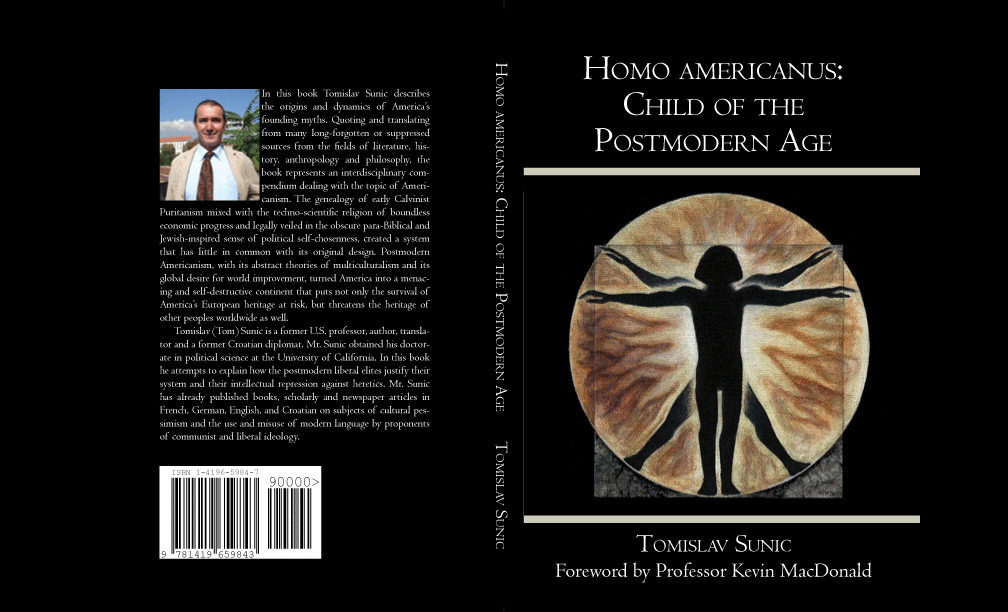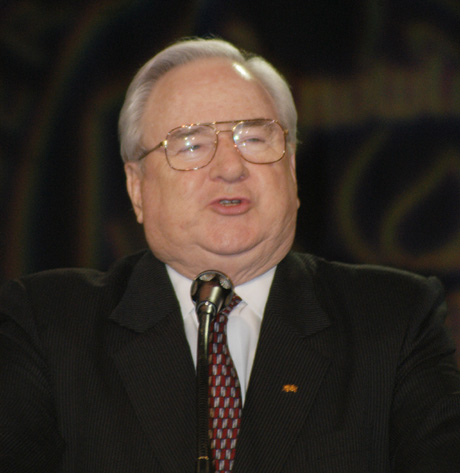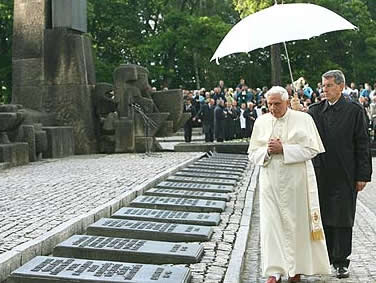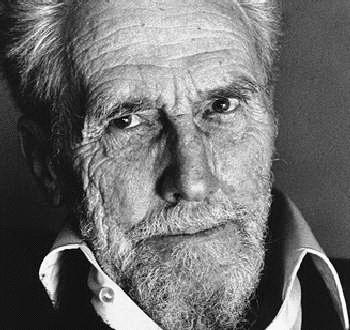Homo Americanus - by Tomislav Sunic

reviewed by Peter Rushmore in the current issue of Heritage and Destiny (issue 29)
click here to buy Homo Americanus at Amazon
Heritage and Destiny readers are already indebted to Dr Tomislav Sunic, a former Croatian diplomat, for his wide ranging analysis of the European New Right, Against Democracy and Equality, reviewed in issue 20. Dr Sunic has now produced what many will regard as a doubly dangerous book. Not only does he dare to write openly about the Jewish Question - a temerity which invites prosecution in many European countries - but he goes much further than most critics of Jewish influence in America in tracing the roots of a cultural malaise which lies behind the slavish U.S. commitment to the Zionist project, all the way back beyond the familiar neocon targets, via ‘Christian Zionism’, and ultimately to the Christian origins - the founding myths - of America.
As a friend of mine aptly commented recently: "You don’t have to be Jewish to be Jew-ish". Sunic notes that:
The Jewish-American lobby has its supporters among Christian Gentiles who often wish to show in public that they are more Jewish than the Jews themselves. This trait of political mimicry is widespread among American intellectuals and politicians who also wish to prove that they are more Zionist than Zionist Jews.

The late Jerry Falwell, founder of the Moral Majority, was the most influential of the Christian Zionists typical of Homo Americanus
This book was published before the recent death of the most politically influential Christian Zionist, Jerry Falwell, but revelations in some of Falwell’s obituaries bolster Dr Sunic’s case. It turns out that when Israel bombed Iraq’s nuclear reactor at Osirak in 1981, Israeli Prime Minister Menachem Begin briefed Falwell by telephone even before he called the Reagan White House, demonstrating a shrewd appreciation of the realities of power in the Republican Party, and of the origins of the alliance between American conservatism and Zionism.
Dr Sunic does not present Christian Zionism as some crude conspiracy of venal pastors and crypto-Jews. Nor does he view the U.S.-Zionist embrace (as more shallow analyses by more orthodox political commentators have tended to) as merely contingent on the ‘neoconservative’ reaction (developing out of early American Trotskyism) against Stalinist ‘anti-semitism’,
His approach is to set Christian Zionism in the context of America’s broader political culture. Dr Sunic maintains that a fundamental deceit is at the core of the American system, just as it was behind the Iron Curtain. But most victims of Soviet tyranny had seen through the official lies decades before the system’s final collapse and had been only maintaining a polite fiction of believing in communist ideology.

Soviet tyranny in Berlin collapses, 1989; does thought control
in today's America function better
In America, by contrast, politicians and scholars, let alone the masses, passionately believe in every written word of democratic discourse... [As] an unwritten rule, seldom can one see rallies in America that challenge the democratic substance of Americanism or the ceremonial language of the American ruling class.
...To put it crudely, postmodern Americans and the Americanized masses in Europe are better fooled and deceived by official propaganda than were the Sovietized and communized masses in Eastern Europe. Due to the torrent of meaningless vocables and idioms, such as ‘human rights’ and ‘democracy’, the thought control and intellectual repression in postmodern America functions far better.
The postmodern world appears to allow this American ideology to be adopted with infinite flexibility by former leftists and ‘postcommunists’, eager to extend (and profit from) market liberalism amid the ruins of the Eastern Bloc. As Dr Sunic observes, one reason for this is that Americanism has always parroted slogans about equality and global humanity. Even as Marxism has been officially consigned to the museums, Soviet-style slogans about "ethnic sensitivity training" and the like proliferate in American public life, especially in academia.
No longer are professors required to demonstrate skills in their subject matters; instead they must parade with sentimental and self-deprecatory statements which, as a rule, denigrate European cultural heritage.
The very ubiquity of these messages, Dr Sunic suggests, is an indication of the underlying weakness of the American system rather than a sign of strength, let alone permanence.
If something is ‘self-evident’ it does not need to be repeated ad infinitum, it need only be stated once. Communist systems were replete with ‘self-evident truths’ and questioning that truth could land a dissident in jail. One may surmise that if a political belief or an idea, such as is the case with Americanism today, is founded on strong empirical evidence, it does not need to be repeated ad nauseam. Conversely, if an ideology or a political belief is founded on frail evidence, its enforcers and disciples are obliged to resort to its constant repetition.
Dr Sunic quotes Jean Baudrillard, the postmodernist critic of America, who has died since this book went to press, to support his argument that the "constant verbal and visual featuring of Jewish Holocaust symbolism" creates a "saturation process among the audience as was once the case with former Holocaust symbolism". Relentless exterminationist propaganda, not to mention the vicious persecution of those who dissent from the dominant ideology, becomes self defeating.
In Baudrillard’s words even the image of Auschwitz itself - the holy of holies - becomes hyperreality: "not a site of annihilation but a medium of dissuasion". In other words the exterminationists themselves eventually transform Auschwitz in the public mind from a "historical fact" to a propaganda or marketing tool.

The Pope at Auschwitz in 2006 - a historical image
turned into a marketing tool
Let us hope that this prospect of exterminationist hegemony defeating itself - or to quote Marx providing its own gravediggers - brings some comfort to its interim victims, such as Ernst Zundel and Germar Rudolf. As Dr Sunic notes elsewhere:
Despite its vaunted First Amendment, America has also shown on countless occasions how it rids itself of its own heretics - often under cover of free speech and in the name of proverbial human rights. American politicians and academics are aware of the fact that even a minor critical comment about Jews and Judaism can ruin their career - and life.
H&D readers will be familiar with the standard treatment of "anti-semitism" which treats it as a form of mental illness. Serious criticism of Judaism cannot even be discussed in a rational manner, even to be refuted. Both Americans and Jews therefore appear immune from introspection, which Sunic concludes may eventually prove a weakness.
This is more than a political, propagandistic sleight of hand. It stems from the very founding of America and the notion of "self-chosenness" which conditions Americans’ view of themselves. The German social scientist Werner Sombart - a leftwinger who was by no means an anti-semite - wrote in 1913 that "what we call Americanism is nothing else than the Jewish spirit distilled," and few would dispute that this remains a reasonable summary of Homo Americanus almost a century later.
After the events of September 11th 2001 President Bush and his allies - notably the overtly Christian Tony Blair - implied that our common Christian heritage helped to bind Americans and Europeans, and contributed to a supposedly widespread European reaction that "we are all New Yorkers" after 9/11.
Yet as the eminent political philosopher of the French New Right Alain de Benoist has written, the Christian "self-chosenness" built into America’s founding myths involves a rejection of their European heritage.
"Not only did the Americans desire to break away from Europe," writes de Benoist. "They also wanted to found a society which would be capable of regenerating the whole of mankind. They wanted to create a Promised Land which would become a universal republic. This Biblical theme which is at the heart of the Puritan mind comes back over and over again as the real leitmotiv in the entire American history."
We can see the consequence of this Judeo-Christian messianism in the bloody chaos of Iraq.
Dr Sunic suggests that the constant self-censorship which Americans impose on themselves, by treating any serious criticism of Judaism as psychopathic "anti-semitism", is dangerously artificial and sows the seeds of future conflict:
Mendacity carries the germ of a civil war. The entire Western history, particularly since the First World War, has abundantly proven that distorted self-perceptions, as well as the romanticized perception of the "Other," if based on negative wishful thinking, lead to war and chaos. Eventually, both American Jews and American Gentiles will be pitted into an ugly clash from which there will be no escape for any of them.
...If the subject of Jews is mentioned in America, then it is usually in a laudatory fashion, which clearly points to a morbid desire of postmodern American white elites to curry favor with the Jews. These same individuals will be the first to declare themselves certified anti-Semites when an opportunistic moment becomes official enough for pogroms and Jew baiting.
Yet Dr Sunic goes on, in a section which should be compulsory reading for many in the movement, especially the many varieties of Christian "anti-semite", to reject the most obvious forms of Jewish conspiracy theory.
Contrary to classical anti-Semitic arguments, strong Jewish influence in America is not only the product of Jews; it is the logical result of Gentiles' acceptance of the Jewish founding myths that have seeped over centuries into Europe and America in their diverse Christian modalities. Postmodern Americanism is just the latest secular version of the Judean mindset.
...Blaming American Jews for extraterrestrial powers and their purported conspiracy to subvert Gentile culture borders on delusion and only reflects the absence of dialogue. American anti-Semitic delusions only provide legitimacy to American Jews in their constant search for a real or surreal anti-Semitic boogieman around the corner. Without the spectre of anti-Semitism, Jews would likely assimilate quickly and hence disappear. Thus, anti-Semitism provides Jews with alibis to project themselves as victims of Gentile prejudice. Consequently, it assigns them a cherished role of posing as the sole educational super-ego for Americans and by proxy the entire world.
The logic of Dr Sunic’s argument is that an American patriot must make a conscious effort to free himself from postmodern America. While "diversity" is the postmodernists’ magic word, their ideology actually enforces uniformity. Postmodernist "tolerance" is paradoxically tyrannical; any and all accepted truth is open to question in theory, but in practice certain "truths" related to ethnic identities have a privileged status.
An American hero for Dr Sunic in this context was Ezra Pound, imprisoned and (Soviet-style) confined to a lunatic asylum by his fellow Americans for his unorthodox views in the 1940s and 1950s. Emigrating after his release in 1958, Pound told a crowd of supporters in Naples: "I left for good a psychiatric asylum of 180 million people."

Ezra Pound - an American hero
More traditional conservatives might usefully contemplate Pound’s assessment of the American founding father Thomas Jefferson in Jefferson and/or Mussolini, first published in 1935: "The heritage of Jefferson, Quincy Adams, old John Adams, Jackson, Van Buren is HERE, NOW in the Italian peninsula at the beginning of the fascist second decennio, not in Massachusetts or Delaware."
Dr Sunic will raise a few eyebrows in the movement with his criticism of racialists and other paleo-conservatives for their fixation on genetic determinism and consequent preoccupation with IQ and other forms of scientific assessment, while neglecting any serious examination of culture, art or language.
Furthermore, American racialism, which boasts some intelligent writers, hardly squares with Biblical fundamentalism, which continues to be the trademark of most American traditionalists and racialists. As long as traditionalist Americans continue to lug about their monotheistic deities, they will be in a permanent position of political contradiction. Their neurotic behaviour, i.e. the acceptance of Christian ecumenism on the one hand and the tacit approval of racial segregation on the other, cannot be a weapon for cultural success.
If racial nationalists are to have any hope of capturing cultural hegemony, they need to step back from the "hyperanalytical" approach which Dr Sunic criticises and revive our European heritage, imbued by classical values. Any readers feeling depressed by such temporary setbacks as BNP election results or petty factionalism can turn to the few lines that conclude Sunic’s fourth chapter:
Who knows, with the death of communism and the exhaustion of postmodern Americanism, one may be witnessing the dawn of a new American culture and a return to ancient European heritage. Who can dispute the fact that Athens was the homeland of European America before Jerusalem became its painful edifice?
Reviewed by Peter Rushmore, Manchester, England
This review was first published in number 29 (July-September 2007 issue) of Heritage and Destiny magazine. For a sample copy of Heritage and Destiny send £3.00 to BCM Box 7318, London, WC1N 3XX or $5 to PO Box 6501, Falls Church, VA 22046.